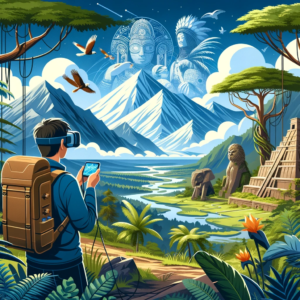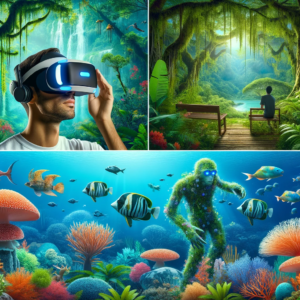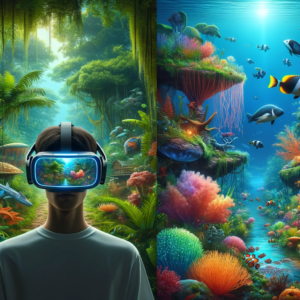Overview
Eco-tourism is a radically changing concept in a world where nature and technology coexist. Virtual Reality (VR) has become a valuable instrument in sustainable travel and is no longer limited to gaming. This guide examines how virtual reality changes eco-tourism and provides ethical and enlightening experiences.
Eco-tour ism’s Ascent
Fundamentally, eco-tourism is a responsible kind of travel. Its primary goals are to explore natural regions with the least negative influence on the environment, support conservation initiatives, and help local populations. Despite obstacles, including accessibility and the carbon footprint of travel, this travel concept has gained popularity in the wake of mounting environmental concerns.
VR: A Novel Prospect for Ecotourism
Let’s talk about virtual reality. Virtual reality technology allows people to see a variety of global ecosystems without ever leaving their homes. This section explores how virtual reality (VR) provides a zero-footprint alternative to experience the marvels of nature, so offering a solution to the limits of traditional eco-tourism.

The Technological Wonders of VR Eco-tourism
The technological developments that enable virtual reality eco-tourism are covered in this section. It discusses how to create immersive virtual reality worlds, what gear is needed to make these experiences possible, and the software that makes faraway places seem closer to home. The emphasis is on how these technologies mimic the sounds and sensations of the natural world, such as the chilly air from a mountaintop or the sound of leaves rustling in a jungle.
Seeing the World in Virtual Reality
Here, we examine the range of VR eco-tourism experiences currently offered. Every adventure is detailed, from swimming in the Great Barrier Reef to hiking in the Amazon Rainforest. This section demonstrates how virtual reality (VR) can be thrilling and informative, giving users access to ecological and wildlife insights that many may never see in person.
Preservation and Social Effects
Eco-tourism’s contribution to community development and conservation is a crucial component. This section looks at how VR eco-tourism can help achieve these objectives. It talks about how the money made from virtual reality experiences may be reinvested in local communities and conservation initiatives, resulting in a sustainable paradigm that is advantageous to all parties.

Aspects of Psychology and Ethics
While VR eco-tourism has many benefits, this section explores the ethical and psychological ramifications. It raises concerns about whether virtual experiences can replace actual travel and how this change would impact our interactions with the outside world and the natural environment.
The Prospects for VR Ecotourism
This section makes predictions about what is ahead for virtual reality eco-tourism. It explores future directions for VR technology, including more realism and interactivity, and how these developments might improve eco-friendly travel experiences even more.
A Useful Manual for Enthusiasts
This section provides helpful guidance for individuals interested in investigating VR eco-tourism. It offers advice on selecting the best VR gear, locating high-quality content, and maximizing VR travel experiences. It also provides rules for appropriate interaction with these online spaces.
In conclusion, a New Travel Era
Ultimately, this guide demonstrates how virtual reality is revolutionizing eco-tourism and our perception of travel. It highlights the need to balance conservation and discovery and encourages readers to welcome this new age of ethical, ecological, and experiential travel.
